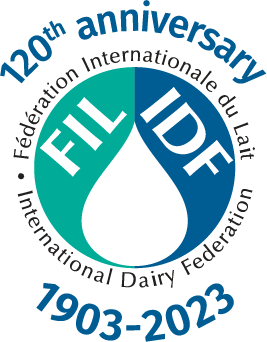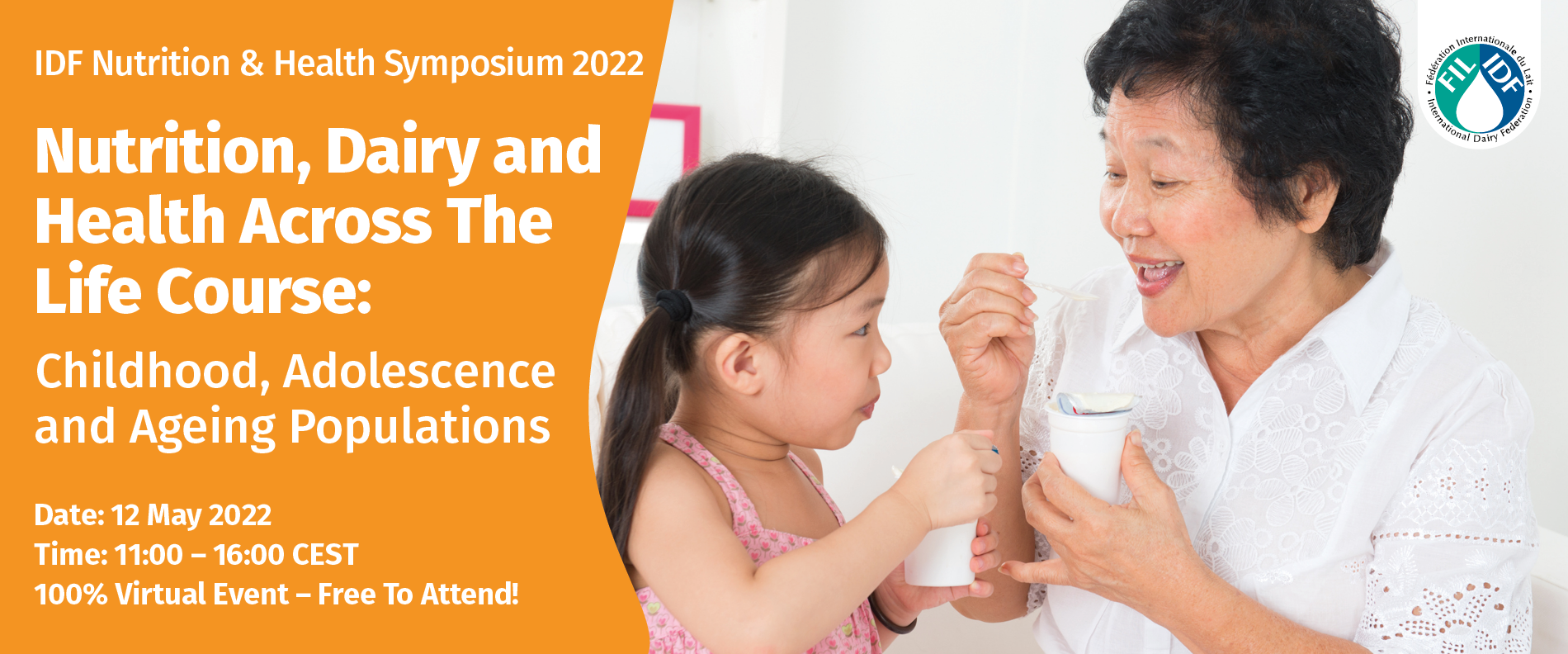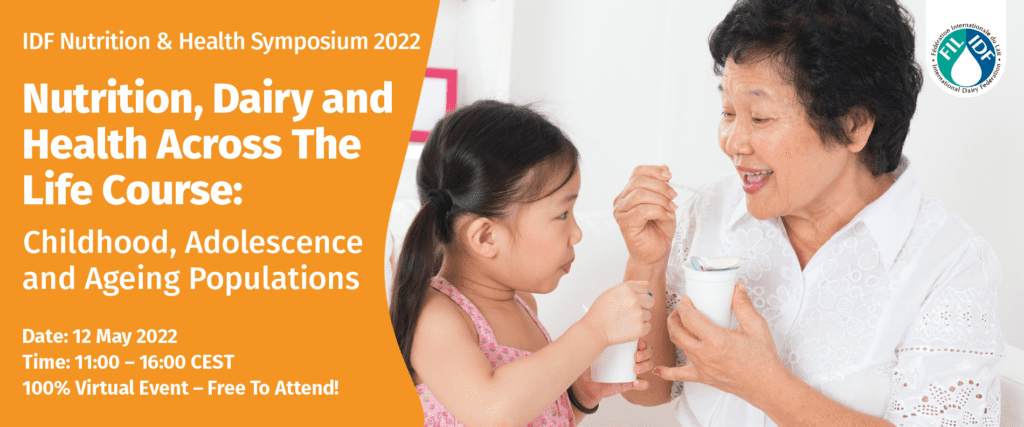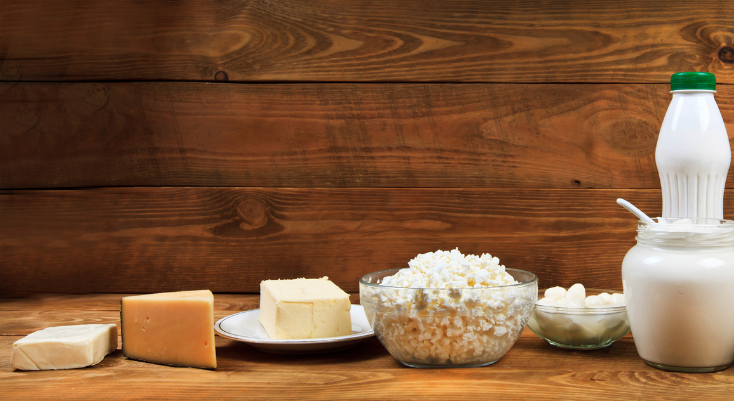Today, IDF organised its annual Nutrition and Health Symposium, focusing on the role dairy plays across the life stages.
Over 200 nutrition and health professionals from all over the world virtually attended the event led by 8 experts and 2 moderators from various regions of the world. Good nutrition is key for health and wellbeing throughout life and can help us live our life to the fullest. Dairy products are nutrient-rich and are a source of protein, B vitamins, iodine, calcium, phosphorus, vitamin A, zinc and potassium – making them an excellent choice for nutritional needs at all ages and stages of life. The unique combination of nutrients and bioactive factors, and how they interact with each other in the dairy matrix, combine to produce the overall effect on health.
Nutrition and health professionals from all over the world listened to international experts discuss the latest research on dairy, nutrition, and health. During the first session, experts presented on the role of dairy in maternal diets, for children and teenagers.
One of the main challenges during pregnancy and lactation is the increased demand for micronutrients, such as folate, vitamin B12, iodine and calcium. Dairy products contain these nutrients naturally, helping to nourish both mother and foetus, as explained by Professor Ian Givens from Reading University: “Those who chronically consume suboptimal amounts of calcium may be at risk of excessive bone loss and may need additional calcium to meet both foetal and maternal needs. Milk and dairy foods are often the primary sources of calcium which are generally of higher bioavailability than from other sources”.
Dairy products are an important source of essential amino acids, fatty acids, vitamins, and minerals which can prevent undernutrition and support healthy growth and development during childhood through to adulthood: “However important, the focus on the first 1000 days is insufficient, as intervention is also required in three later phases: middle childhood (5-9 years), when infection and malnutrition constrain growth; adolescent growth spurt (10-14 years) and the adolescent phase of growth, brain maturation and consolidation (15-19 years) if a child is to achieve his full potential as an adult – an important but often overlooked area being the diet”, Professor Seema Puri from Delhi University said.
Food-based dietary guidelines are key to provide healthy eating guidance in every life stage. However, only a few countries such as South Africa, Kenya or Nigeria have guidelines tailored to the specific nutritional needs of children. Professor Lisanne Du Plessis, from Stellenbosch University explained: “Barriers to following the guidelines included limited physical and financial access to resources, cultural/family practices, poor social support, and time constraints”.
The last speaker of the first session touched on the type of milk that children should drink. Contrary to popular belief, there are no additional health benefits to consuming reduced-fat dairy for children, as Professor Theresa O’Sullivan concluded in her study: “changing to reduced-fat dairy does not result in improvements to markers of adiposity or cardiometabolic disease risk in healthy children”.
The physiological and psychological changes that accompany us throughout adulthood lead to new challenges and needs, and the role of health professionals is to prevent and manage illness that may arise. Therefore, the second session of the Symposium discussed the role of nutrition for the ageing population. Dairy, as part of a protein-rich diet, is essential to prevent Sarcopenia, a condition that reduces muscle mass and strength. Dairy’s protein content, especially in the amino acid leucine, is an essential ally in maintaining mobility and independence. “Acute protein intake increases muscle protein synthesis, essential for maintaining muscle protein anabolism and muscle mass. On the contrary, lack of protein intake, especially in breakfast, has been shown to increase the risk of skeletal muscle loss regardless of the age group”, Professor Fujita Satoshi from the Ritsumeikan University of Japan affirms.
The nutritional quality of dairy products complements healthy muscles and a healthy skeleton, two areas intrinsically connected. They make up the easiest to use and most cost-effective food group to achieve great effects in fracture prevention and maintenance of mobility. This was well demonstrated by Professor Sandra Iuliano, from the University of Melbourne: “Dairy foods, such as milk, yoghurt and cheese are the major dietary sources of these nutrients [high-quality protein and calcium] so supplementation using these foods may be an effective way to address bone fragility and fracture risk in our ageing population. Dairy supplementation either in part or as a whole food is associated with attenuation of bone and muscle loss in older adults”.
Milk and dairy show signs of supporting brain health. Some bioactive components from milk such as cysteine could contribute to improving brain health in ageing population. The bioactive milk peptides in dairy products display antioxidant potential, including in the nervous system, which justifies the benefits of including 3 portions of dairy in the diet of those experiencing a decline in cognitive function, such as seen in Multiple Sclerosis. As Professor In-Young Choi expresses, “A recent randomized controlled dietary intervention trial confirms the potential benefit of milk intake to raise brain Gluthation, a major brain antioxidant, in older adults”
Dr Estêvão, a registered dietitian from Portugal, demonstrated how dairy products can be used in clinical settings as an easy, affordable, and reliable source of high-quality and bioavailable protein, calcium and phosphorus for a population with a very high risk of malnutrition, sarcopenia and fractures.
As IDF Director General, Caroline Emond, said in her opening remarks, Nutrition and Health is one of IDF’s pillars and therefore part of its mission is to stress the vital role of Dairy in nutrition all throughout life’s course. This year’s edition of IDF’s Nutrition and Health Symposium sought to underline both the importance of milk and dairy intake as well as IDF’s commitment to promoting its relevance for a healthy life.











